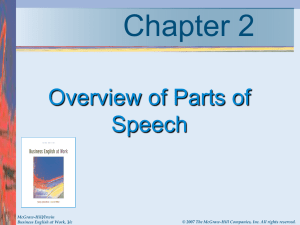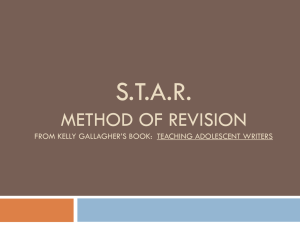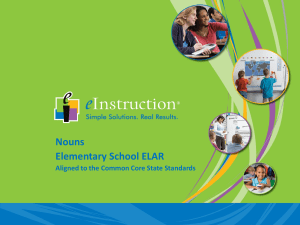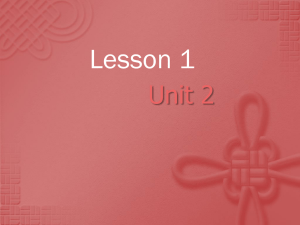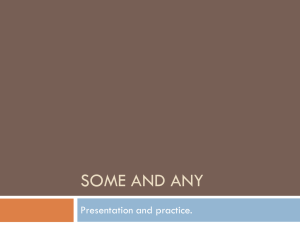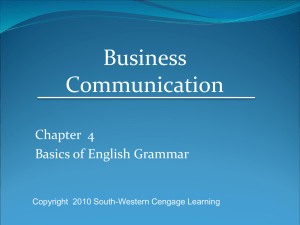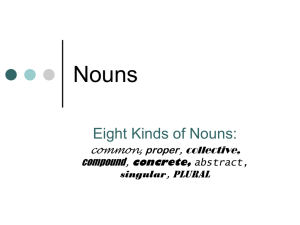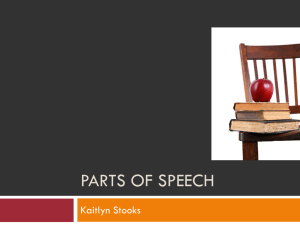Parts of Speech - Skills Workshop
advertisement
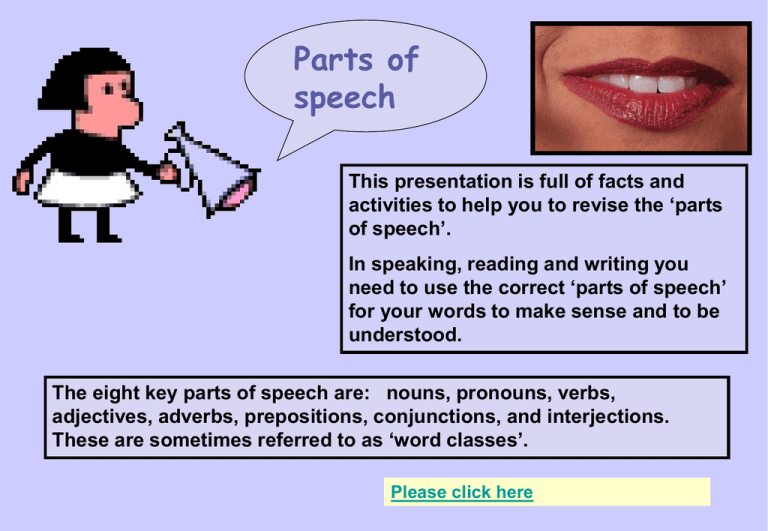
Parts of speech This presentation is full of facts and activities to help you to revise the ‘parts of speech’. In speaking, reading and writing you need to use the correct ‘parts of speech’ for your words to make sense and to be understood. The eight key parts of speech are: nouns, pronouns, verbs, adjectives, adverbs, prepositions, conjunctions, and interjections. These are sometimes referred to as ‘word classes’. Please click here Parts of speech adjectives nouns verbs pronouns imperative verbs adverbs proper nouns collective nouns preposition conjunction interjection You will need a pen and some lined paper. Please click on a link to view the part of speech that you would like to study. adjectives Adjectives are describing words that usually come before a noun (the name of a person, place or thing). Adjectives can describe a look, a mood or even a character. Examples: The old house had a lovely garden. It was a cold day. The beautiful dress cost £400! Click here for an activity The grumpy teenager stamped her feet. The lazy man never did any work. Click here to return to the main page ‘parts of speech’ Click here for the answers adjectives activity Click for a printable version Task: re-write these sentences replacing the underlined word with the most fitting word from the box below (or your own word) to make these descriptive sentences more interesting. 1. Leeds is a nice city with a good night life. 2. Park Lane College is a good college with nice students. 3. Returning to study is a nice thing to do. 4. It can be nice to be able to sit and chat with friends. 5. It can be nice to go for long walks in the summer. relaxing pleasant hard-working clever brilliant vibrant fantastic lively Click here to return to the main page ‘parts of speech’ friendly challenging rewarding You can look up words using an online dictionary such as www.askoxford.com Click here to return to the main page ‘parts of speech’ adjectives activity – type, print page & check. Write an adjective in the boxes to make the writing more interesting. Salina thinks that George is a George because of his man. She likes to spend time with personality. She thinks he is a friend. George likes Salina because she is a George likes to watch person. She makes him laugh. movies with Salina, so that they have something to talk about over dinner. Adjectives you might use: action genuine happy confident mean interesting kind funny documentary boring brilliant angry adjectives - answers • Leeds is a vibrant city with a fantastic night life. • Park Lane College is a friendly college with hard-working students. • Returning to study is a rewarding thing to do. • It can be pleasant to sit outside and chat with friends. • It can be relaxing to go for long walks in the summer. You may have used different words for your answers. This is just an example of the selection you could have made. Ask your tutor to check your work. Click here to return to the main page ‘parts of speech’ nouns A noun is the name of something. A common noun is the name of a general thing: ice cream, dog, cat and pen are all everyday nouns. A concrete noun is something you can see, hear, smell feel or taste: It was a very tasty pizza dripping with cheese, ham and pineapple. It was a vanilla ice cream. She wore a woolly cardigan. An abstract noun is an idea, feeling or quality that you cannot touch. It is something you cannot see, smell, touch or taste. For example: loneliness, politeness, happiness, sadness, faith, courage, embarrassment, bitterness. Click here for an activity. Click here to return to the main page ‘parts of speech’ You can look up words using an online dictionary such as www.askoxford.com Click here for the answers common and abstract nouns activity Activity one: look at this piece of writing. “She had no more clean dishes, clean knives or clean forks. Although she was not known for her tidiness, the house was unusually messy today. Rather than do the cleaning and cook a meal, Bev decided she would go out and get a takeaway. She had had too many late nights and her tiredness was making it harder to cope with the housework.” Activity two: make a list of all the common nouns you see. Activity three: make a list of all of the abstract nouns you see. Do you notice anything about them? Click here to return to the main page ‘parts of speech’ common and abstract nouns - answers “She had no more clean dishes, clean knives or clean forks. Although she was not known for her tidiness, the house was unusually messy today. Rather than do the cleaning and cook a meal, Bev decided she would go out and get a takeaway. She had had too many late nights and her tiredness was making it harder to cope with the housework.” Common nouns: dishes, knives, forks, house, takeaway, housework, today, meal, nights Abstract nouns: tidiness, tiredness Click here for an activity on turning adjectives into nouns Click here to return to the main page ‘parts of speech’ turning adjectives into nouns Adjectives: happy forgetful sad weak good ready tidy She was a happy girl but she could also be a weak person. (Happy and weak are used here to describe the girl’s character). Activity: turn the adjectives in the box into nouns by adding a –ness ending e.g. sadness. Remember that when words end in ‘y’ you should change the ‘y’ into an ‘i’ e.g. readiness. Extra activity: put two of these words into sentences of your own. Click here to return to the main page ‘parts of speech’ pronouns When we write about people using their names over and over again our writing can become boring. For example: Ali is great at hands-on work. Ali wants to get onto an apprenticeship scheme to become an engineer. Ali works very hard at school. Ali is doing well in his exams. You can replace the name Ali with the word ‘he’ because the reader now knows (after the first Ali) who you are talking about. Click here for more on pronouns Click here to return to the main page ‘parts of speech’ pronouns continued The same piece of writing using the pronoun ‘he’: Ali is great at hands-on work. He wants to get onto an apprenticeship scheme to become an engineer. He works very hard at school. He is doing well in his exams. Personal pronouns: it he she they I we Objective pronouns: me you her him it us you you them Click here for an activity on using pronouns Click here to return to the main page ‘parts of speech’ Click here to return to the main page ‘parts of speech’ pronouns activity Re-write the following sentences choosing the best pronoun to replace the person / people being written about. 1. Sharon is a brilliant swimmer. Sharon wants to compete professionally. Sharon is a very fast swimmer. 2. Bob, Mat and Bev go to the pub a lot. Bob, Mat and Bev like to drink. Bob, Mat and Bev are best friends and spend most nights together in their local pub. 3. I like to go to the shops. Jane likes to go to the shops too. Jane and I often go shopping together. Jane and I can spend a lot of money if Jane and I are not careful. Use either: I, we, they, you, it, he or she. Click here for an activity proper nouns • A proper noun is the name of something unique. • A proper noun could be the name of a person or a place, for example: James, Samera, Leeds, Bradford, Park Lane College, England, Gregg’s, Cineworld and Burger King. Click here to return to the main page ‘parts of speech’ Click here to return to the main page ‘parts of speech’ Click here for interactive, printable activity proper nouns - activity 1. 2. Draw a table like the one on the right. Look at the following nouns and write them under the correct heading. • • • • • • • • • • The Corn Exchange shops pool Lightwaves Tracy college biscuit Park Lane Jaffa Cakes girl Common noun Proper noun Click here to return to the main page ‘parts of speech’ proper nouns – type, print and check Common noun Proper noun The Corn Exchange college shops biscuit pool Park Lane Lightwaves Jaffa Cakes Tracy girl Click here for the answers Click here to return to the main page ‘parts of speech’ proper nouns - answers Common noun Proper noun Shops The Corn Exchange pool Lightwaves girl Tracy college Park Lane biscuit Jaffa Cakes Click here to return to the main page ‘parts of speech’ collective nouns Collective nouns are used to show a collection of people or things regarded as a unit. Common collective nouns are: team enemy committee group clergy family company flock public Click here for an activity on using collective nouns using collective nouns When we use collective nouns we have to think about whether we are talking about them as singular (one group as a whole e.g. the team is playing well…) or plural (a group of people in a team = the team have been playing well). For example: The police are having trouble catching a gang of thieves (‘are’ shows we are talking about more than one unit) Her family is falling apart. (We are talking about one family, this is singular and so we use ‘is’). Activity: take the collective nouns ‘family’, ‘class’ and ‘company’ and write sentences showing their meaning. Take care and discuss your sentences with your tutor to get advice on your grammar if you are unsure about whether you are using them as singular or plural nouns. Click here to return to the main page ‘parts of speech’ verbs Some verbs are action words: Some verbs show feelings or states and are there to act as links to add description to a noun. Explain Instruct Speak Cook Run is (he is boring) am (I am boring) been (he has always been boring) was (he was always told he was boring) have (I have always been boring) feel Click here to return to the main page ‘parts of speech’ (I feel I have been boring today) Click here to return to the main page ‘parts of speech’ imperative verbs Silence! Shut the door! Sit down! Stir the rice. Light the fire. Imperative verbs can be orders or commands. These are words that tell you what to do. Imperative verbs are often used in instructional writing such as: •Recipes •Manuals •Washing labels •Medicine packets Click here for an activity page Click here to return to the main page ‘parts of speech’ imperative verbs - activity Write down all of the imperative verbs that you can see in this recipe. Method: 1. Fill a pan with cold water 2. Bring the water to the boil 3. Stir-fry the onion and garlic in a little oil 4. Place the pasta into the pan of boiling water – reduce the heat and allow to simmer for ten minutes 5. Add the stir-fry vegetables to the wok and fry on a high heat for two minutes 6. Remove the pasta from the heat, drain and empty onto the plates 7. Add the stir-fried vegetables and serve. Click here for the answers imperative verbs - answers Method: 1. Fill a pan with cold water 2. Bring the water to the boil 3. Stir-fry the onion and garlic in a little oil 4. Place the pasta into the pan of boiling water – reduce the heat and simmer for ten minutes 5. Add the stir-fry vegetables to the wok and fry on a high heat for two minutes 6. Remove the pasta from the heat, drain and empty onto the plates 7. Add the stir-fried vegetables and serve. Answers are in bold. Click here to return to the main page ‘parts of speech’ adverbs An adverb can tell us: how something is done, time, place, cause or degree. Adverbs often have an -’ly’ ending such as: •slowly (how) •quickly (how) •gently (how / manner) An adverb can answer questions such as: "how," "when," "where," "how much". •happily (manner) •noisily (manner) •lately (time) •occasionally (how often) Click here for adverbs activity Click here to return to the main page ‘parts of speech’ Hint: to check the meaning of an adverb take off the ‘ly’ when looking for the word in the dictionary adverbs - activity Activity: re-write these sentences using the best adverb from the box below. 1. She spoke to the man so ____________ that she made him cry. 2. He sang so ___________ that all of the judges laughed. 3. The pan was balanced so ______________ close to the edge it was amazing that it didn’t fall off. 4. They laughed ____________ at the comedian – because he was so bad! 5. Her hair was styled _____________. 6. Get ready _________ or you will miss the bus! 7. Come over here __________. The baby is asleep. quietly beautifully harshly dangerously Click here to study adverbs as joining words terribly uncontrollably Click here to return to the main page ‘parts of speech’ adverbs (as conjunctions – joining words) ‘Instead,’ ‘although,’ ‘also,’ ‘otherwise,’ ‘still’ and ‘therefore’ are a few examples of adverbs that can be used to join ideas together in your writing. Examples of adverbs as conjunctions in sentences: She did not have enough money for the dress; therefore she chose a different outfit. The fans waited patiently; finally the doors to the stadium were opened. Click here to return to the main page ‘parts of speech’ For additional work and online activities on prepositions visit: http://www.englishpage.com/prepositions/location_prepositions_2.htm prepositions Prepositions can show time, direction and place. Look at the table below for a few examples. Time Direction Place in into at on onto next to at up on since down under Click here for an activity of directional prepositions Click here to return to the main page ‘parts of speech’ prepositions - activity Decide which preposition for direction should be used and re-write the following sentences inserting the correct preposition. 1. Put the bowl of porridge ___________ the microwave. 2. Put the cup __________. 3. Could you pick the laundry _______ for me, please? 4. Take care as you skate ________ the ice. 5. Go _______ the garden and I will bring out some chairs. 6. Are you travelling ________ to London by car, train or coach? For direction: into Click here for the answers onto up down Click here to return to the main page ‘parts of speech’ prepositions - answers • Put the bowl of porridge into the microwave. • Put the cup down. • Could you pick the laundry up for me, please? • Take care as you skate onto the ice. • Go into the garden and I will bring out some chairs. • Are you travelling down to London by car, train or coach? Click here to return to the main page ‘parts of speech’ Click here to return to the main page ‘parts of speech’ Click here for an activity conjunctions Co-ordinating conjunctions can join two simple sentences together. These form a ‘compound Sentence’ which is made of two ideas that are equally important. Examples: Co-ordinates: • • • • • • • and but or nor for so yet Simon likes tea, and Jan likes coffee. Simon likes tea, but Jan likes coffee. Will you go to the shops, or shall I go to the shops? You should go to the shops, so I don’t have to go to the shops. Click here to return to the main page ‘parts of speech’ Click here for the answers conjunctions - activity Join these simple sentences together to form ‘compound’ sentences using the best co-ordinating conjunction from the box below. 1. I like porridge. Sam likes a fried breakfast. 2. Kevin watches Eastenders. I prefer to watch Coronation street. 3. Abby loves Jim. Kirsty loves Jim too. 4. Mohammed likes to paint. Pat enjoys painting. 5. I enjoy watching movies. We could go to the pictures together. 6. I do not like my flat. Simon says it’s nice. and but or nor for so yet Click here for a mini printable version of the conjunctions task Click here to return to the main page ‘parts of speech’ conjunctions – type, print & check 1. Retype the sentences joining the two simple sentences with the best word from the box below. I like porridge. Sam likes a fried breakfast. Kevin watches Eastenders. I prefer to watch Coronation street. Abby loves Jim. Kirsty loves Jim too. Mohammed likes to paint. Pat enjoys painting. and but or nor for so yet Click here for the answers conjunctions – sample answers 1. I like porridge, but Sam likes a fried breakfast. 2. Kevin watches Eastenders, but I prefer to watch Coronation street. 3. Abby loves Jim, but Kirsty loves Jim too. 4. Mohammed likes to paint, and Pat enjoys painting. 5. I enjoy watching movies, so we could go to the pictures 6. together. 7. I do not like my flat, yet Simon says it’s nice. Click here to return to the main page ‘parts of speech’ interjections Interjections are nearly always used at the start of a sentence - they are there to show emotion and to grab your attention. Common interjections include: wow, ouch, oops, hey, watch, oh, yes, no, move, stop, help… they are usually followed by an exclamation mark! “Oh, you’re coming too? Wow! That’s a surprise.” Click here to return to the main page ‘parts of speech’
